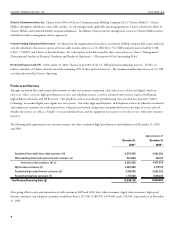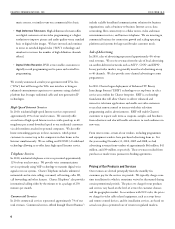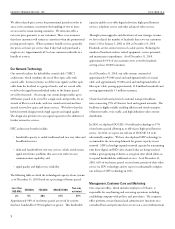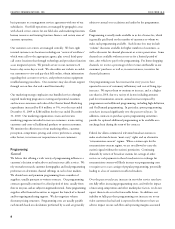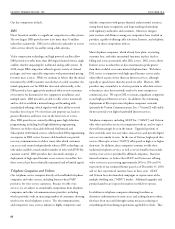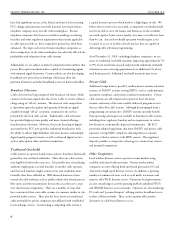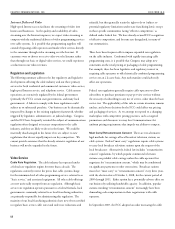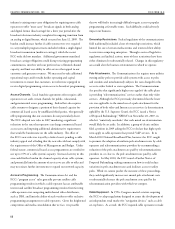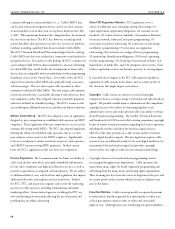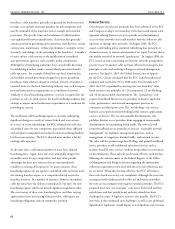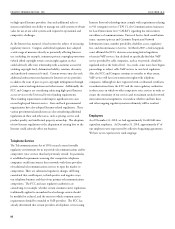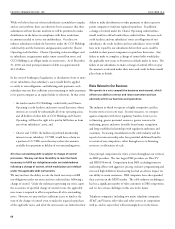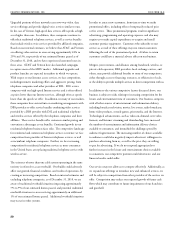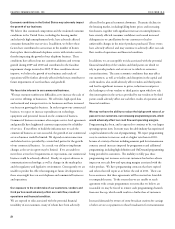Charter 2010 Annual Report Download - page 27
Download and view the complete annual report
Please find page 27 of the 2010 Charter annual report below. You can navigate through the pages in the report by either clicking on the pages listed below, or by using the keyword search tool below to find specific information within the annual report.
a separate offering of security modules (i.e., a “CableCARD”) that
can be used with retail navigation devices, and to use these separate
security modules even in their own set-top boxes deployed after July
1, 2007. is requirement, known as the “integration ban,” has increased
the cost of set-top boxes e FCC has, however, recently granted
waivers that allow cable operators to use low-cost, one-way set-top boxes
(without recording capability) that do not include CableCARDs.
e FCC’s National Broadband Plan acknowledges that the existing
CableCARD rules have not resulted in a competitive retail market for
navigation devices. In response to this finding, the FCC commenced
a proceeding in April 2010 to adopt standards for a successor technology
to CableCARD that would involve the development of smart video
devices that are compatible with any multichannel video programming
distributor service in the United States. In October 2010, the FCC
adopted new interim CableCARD rules applicable until a successor
solution emerges. e new rules require cable operators to allow
customers to self-install CableCARDs. ey also require cable operators
to provide and advertise a reasonable discount if subscribers use their
own equipment, rather than using the operator-provided equipment
otherwise included in a bundled package. e FCC’s actions in this
area could impose additional costs on us and affect our ability to innovate.
MDUs / Inside Wiring. e FCC has adopted a series of regulations
designed to spur competition to established cable operators in MDU
complexes. ese regulations allow our competitors to access certain
existing cable wiring inside MDUs. e FCC also adopted regulations
limiting the ability of established cable operators, like us, to enter
into exclusive service contracts for MDU complexes. Significantly,
it has not yet imposed a similar restriction on private cable operators
and SMATV systems serving MDU properties. In their current
form, the FCC’s regulations in this area favor our competitors.
Privacy Regulation. e Communications Act limits our ability to
collect and disclose subscribers’ personally identifiable information
for our video, telephone, and high-speed Internet services, as well as
provides requirements to safeguard such information. We are subject
to additional federal, state, and local laws and regulations that impose
additional subscriber and employee privacy restrictions. Further,
the FCC, FTC, and many states regulate and restrict the marketing
practices of cable operators, including telemarketing and online
marketing efforts. Various federal agencies, including the FTC, are
now considering new restrictions affecting the use of personal and
profiling data for online advertising.
Other FCC Regulatory Matters. FCC regulations cover a
variety of additional areas, including, among other things: (1)
equal employment opportunity obligations; (2) customer service
standards; (3) technical service standards; (4) mandatory blackouts
of certain network, syndicated and sports programming; (5)
restrictions on political advertising; (6) restrictions on advertising
in children's programming; (7) restrictions on origination
cablecasting; (8) restrictions on carriage of lottery programming;
(9) sponsorship identification obligations; (10) closed captioning
of video programming; (11) licensing of systems and facilities; (12)
maintenance of public files; and (13) emergency alert systems. Each
of these regulations restricts our business practices to varying degrees.
It is possible that Congress or the FCC will expand or modify its
regulation of cable systems in the future, and we cannot predict at
this time how that might impact our business.
Copyright. Cable systems are subject to a federal copyright
compulsory license covering carriage of television and radio broadcast
signals. e possible modification or elimination of this compulsory
copyright license is the subject of continuing legislative and
administrative review and could adversely affect our ability to obtain
desired broadcast programming. e Satellite Television Extension
and Localism Act of 2010 revised cable’s existing compulsory copyright
license to remove certain uncertainties regarding the license’s operation,
including the royalty calculation for broadcast signals that are
offered to only some portions of a cable system and the treatment
of new digital broadcast signals. e new legislation requires cable
systems to pay an additional royalty fee for each digital multicast of a
retransmitted distant broadcast signal and provides copyright
owners with a new right to audit our semi-annual royalty filings.
Copyright clearances for non-broadcast programming services
are arranged through private negotiations. Cable operators also
must obtain music rights for locally originated programming and
advertising from the major music performing rights organizations.
ese licensing fees have been the source of litigation in the past, and
we cannot predict with certainty whether license fee disputes may
arise in the future.
Franchise Matters. Cable systems generally are operated pursuant
to nonexclusive franchises granted by a municipality or other state
or local government entity in order to utilize and cross public
rights-of-way. Although some state franchising laws grant indefinite


